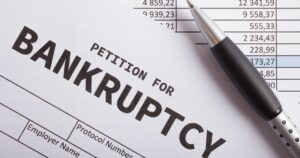Can you file for bankruptcy with a felony conviction on your record?
Being convicted of a felony affects you in numerous ways, including your career choices, government aid, and possibly your bankruptcy status. If you have been convicted of a felony, you may have limitations on what you can claim as an exemption. And depending on the crime, you may have difficulty filing for bankruptcy at all.
Filing for Chapter 7 bankruptcy, which is essentially a liquidation, means all assets you own are seized by the court trustee and sold to pay outstanding debts before remaining debts are discharged. As a U.S. citizen, you can file for bankruptcy and use Chapter 7. However, the crime you’re convicted of will limit your rights.
If you were convicted of bankruptcy fraud, embezzlement, or another serious financial-type crime, the U.S. Bankruptcy court would require that you use your homestead exemption – and your exemptions are often limited. This means items you could generally keep when filing bankruptcy would be liquidated to pay down debt.
Other Things That Affect Bankruptcy
Usually, a felony conviction only affects your bankruptcy exemptions, and even then, the crime you are convicted of must be financial or fraud-related. Therefore, if you are convicted of a crime outside of those categories, you may not have any issues with your exemption qualifications.
That said, there is more than just a felony conviction affecting your bankruptcy status. Therefore, it is important that you meet with a bankruptcy attorney to find out if any of the following applies to your case:
Your Income versus Debts
While bankruptcy is a powerful financial tool that essentially pushes the “reset” button on your finances, it has limitations. Not everyone qualifies for Chapter 7 or Chapter 13. To qualify for Chapter 7 bankruptcy, you must first pass the means test.
This test compares your annual household income to the average in your area. If you make substantially more, you may not qualify. Likewise, if the numbers do not add up when comparing your annual income to debts, your application might be denied. Even if you feel as though you live paycheck to paycheck, the courts want to see someone who genuinely has too much debt and too little income to cover that debt. If you have assets, investment accounts, or cash you can use to pay down existing debts, the courts want to see that done first.
Even if you do not qualify for Chapter 7, you may be eligible for Chapter 11 with a higher income. Chapter 11 allows you to create a repayment plan through the court, where you will pay down debts in a three to five-year period.
Employment Status at the Time You File
Chapter 7 and Chapter 13 bankruptcy vary in terms of how long they take to complete. Each has strict qualification standards, and if you are unemployed at the time you file, it will affect which type of bankruptcy you qualify for.
Chapter 13 is a repayment plan; therefore, if you are unemployed, the court will not accept your repayment plan as there is no guarantee you can make those payments. Instead, you may qualify for chapter 7, which is a discharge method. Chapter 7 completes faster than Chapter 13, and if you do not have a job (whether due to a disability or economy), discharging debts may be your only option.
The court will look at the likelihood of you starting another job soon, your past employment income, and how much you could make if you were to obtain gainful employment again. Therefore, your employment status affects what type of bankruptcy you can file for and how the courts will view your circumstances.
Also, if you are newly unemployed, you may not qualify for Chapter 7 at all. The means test looks at your income over a set number of months. Therefore, if you were laid off only a few weeks ago, your past income still calculates into your total for the means assessment.
Time Between Past Bankruptcies
If this is not your first time filing for bankruptcy, you may not qualify to file again.
Once you receive a discharge from Chapter 7, the clock officially starts and you cannot file for Chapter 7 bankruptcy again until eight years have passed. If the case was dismissed, meaning you did not complete the process or receive a discharge, then this timeline does not apply.
If you filed for Chapter 7 but now you want to file for Chapter 13, you must still wait – only this time period is shorter. In this case, you must wait four years from the date of discharge to file for Chapter 13 bankruptcy.
If you filed for Chapter 13 in the past and you were successful, then you must wait six years from the date you filed for Chapter 13 initially to file again.
As you can see, dates and the type of bankruptcy you filed for in the past will significantly affect how long you must wait to file in the future.
Whether You Complete All Necessary Steps
One of the most significant factors that influence whether you can file for bankruptcy is if you file the paperwork on time and you complete the proper steps. Bankruptcy has strict rules for which documents you must file with the courts, creditors to notify, and courses you must take. If you miss any deadline for these steps, your case is dismissed and you must restart the process.
Hire a Bankruptcy Lawyer for Assistance
Understanding the nuances of bankruptcy laws should not be your job. Instead, you want to focus on your family, job, and trying to get out of debt. Hire a bankruptcy lawyer who can go over your financial records, criminal history, and even employment records to find a bankruptcy solution that works for you. Likewise, your attorney will make sure the right paperwork is filed, you do not miss deadlines, and you complete all court-required steps so that your case moves through quickly.
To learn more about your bankruptcy options, contact us today to schedule a consultation.

